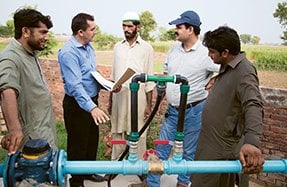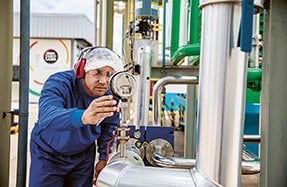Safeguarding our environment

The planet’s natural resources are rapidly depleting as human consumption rises. Natural habitats are declining because of growing populations and increased demand for raw materials from agriculture, fishing and other activities. We need to reverse the trend that has seen us reach the point where we consume 1.6 times what our planet provides.
22 558 tonnes of packaging avoided
253 factories with zero waste for disposal
By the end of 2017 we assessed and addressed the sustainability hotspots for 22 product categories
Our approach
We are committed to environmentally sustainable business practices. We can achieve this through pursuing greater efficiency in resource use, and relying on and improving the environmental performance of our foods and beverages. With our strong belief in the benefits of a more circular economy, where practicable, we can help combat food waste, and support individuals and families in making more informed decisions about the products they buy.
Piloting environmental footprints in Europe
We have supported the Product Environmental Footprint project, helping the European Commission develop category rules for packed water and pet food. We conducted a pilot study of Purina ONE to determine how best to engage customers about sustainable purchasing decisions. A second phase focused on how best to communicate these results to individuals and families, which we tested using both Purina ONE and Nestlé Waters Vittel bottled water.
Partnership to develop 100% bio-based PET bottles
Through the NaturALL Bottle Alliance, Nestlé Waters is working with Danone and Origin Materials, a US start-up, to develop a PET plastic bottle made from 100% renewable materials. The project uses biomass feedstocks used to produce cardboard or sawdust and so does not divert resources or land from food production. With the technology already proven at a pilot level, commercial-scale production of 75% bio-based PET plastic bottles will begin by 2020, reaching 95% by 2022 and eventually 100%.
Reducing food loss and waste
We led the development of the Food Loss & Waste Protocol, on behalf of the Consumer Goods Forum (CGF), and piloted its Food Loss and Waste Accounting and Reporting Standard in our dairy supply chain in Pakistan. A case study, published in March 2017 by the World Resources Institute, showed that the milk lost or wasted across all stages of this complex supply chain was only 1.4% of the amount produced. This confirmed that our support for farmers through technical assistance and training, and by providing adequate cooling, storage and transportation systems, is having a positive effect.
Progress on simplified date labels
As a member of CGF, we have joined its call for retailers and food producers to simplify and standardise food date labels around the world by 2020. We will be required to display either an expiry date for perishable items (e.g. ‘Use by’) or a food quality indicator for non-perishable items (e.g. ‘Best if used by’). CGF members will also be required to educate individuals and families about date labels through in-store displays, online materials and public service announcements.
Using satellite to monitor deforestation
To measure our progress towards our ‘zero deforestation’ ambition, we are piloting the use of satellite technology developed by Airbus. Made available through a unique partnership with The Forest Trust and radar specialists SarVision, the Starling service provides high-resolution satellite and radar images. These help us see where deforestation is occurring and understand whether it is connected to activities associated with our palm oil supply chain.


